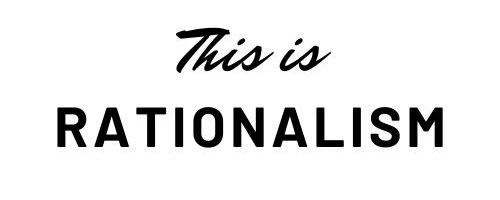
Secular rationalism is more than just a philosophy; it is a lens through which we can view the world with clarity and reason. Rooted in the principles of logic, evidence, and skepticism, it challenges traditional belief systems and emphasizes the importance of human autonomy.
In this post, we will explore secular rationalism in depth, examining its core principles, historical development, influence on modern society, and the criticisms it faces. This framework has shaped scientific inquiry, ethical thinking, and the relationship between religion and politics, making it essential for understanding our world today.
What is Secular Rationalism?
Secular rationalism is a worldview that emphasizes reason, logic, and empirical evidence as the foundation for understanding reality. It rejects supernatural explanations and religious doctrines, asserting that human beings are capable of using their intellect to make sense of the world. At its core, secular rationalism promotes the idea that knowledge and truth should be based on observable facts and logical reasoning, rather than faith or tradition.
This philosophy advocates for the separation of religious influence from public affairs, especially in science, ethics, and politics. Secular rationalists believe that humans have the autonomy to make decisions based on reason and that moral values should be derived from human experience rather than religious dogma.
Key Principles of Secular Rationalism
#1. Empirical Evidence
Empirical evidence is central to secular rationalism. It asserts that knowledge should be grounded in observable data and experiments. This principle encourages individuals to rely on sensory experience and scientific research to verify claims and form conclusions. Unlike religious or metaphysical beliefs, which often lack empirical support, secular rationalism demands that ideas and theories be tested against reality. This commitment to evidence-driven reasoning is foundational to advancing human understanding and technological progress.
#2. Reason and Logic
Reason and logic are the tools through which secular rationalism interprets the world. This principle emphasizes clear, structured thinking to draw conclusions. Logical reasoning allows individuals to avoid fallacies and inconsistencies, promoting sound arguments. Secular rationalists believe that through reasoning, humans can discern truths about the world and make informed decisions. Logic is applied not only in scientific inquiry but also in ethics, politics, and everyday problem-solving, making it essential for rational discourse.
#3. Naturalism
Naturalism is the belief that everything arises from natural causes and laws, without supernatural intervention. Secular rationalists adopt a naturalistic view of the world, rejecting the notion that phenomena require divine or supernatural explanations. This principle holds that the universe operates according to observable patterns that can be studied and understood through science. By focusing on natural processes, secular rationalism seeks to provide comprehensive explanations for everything from the origins of life to the functioning of the cosmos.
#4. Human Autonomy
Human autonomy is a core value of secular rationalism, stressing the importance of individual freedom and self-determination. It advocates that people have the right to make their own choices based on reason and personal values, free from external religious or authoritarian control. Secular rationalists believe that individuals should not be bound by arbitrary religious rules or societal traditions that limit their freedom. Instead, autonomy allows people to pursue their own paths in life, guided by rational thought and personal responsibility.
#5. Ethical Humanism
Ethical humanism within secular rationalism focuses on developing moral values based on human welfare and happiness. Unlike traditional religious ethics, which often derive morality from divine commands, secular rationalists argue that ethical principles should be grounded in human experience and reason. This approach emphasizes empathy, compassion, and fairness, aiming to promote the well-being of all individuals. Secular moral systems are flexible and adaptable, evolving with new insights from science and philosophy to better serve humanity’s needs.
#6. Separation of Church and State
The separation of church and state is a foundational principle of secular rationalism, advocating for the independence of religious institutions from government. This ensures that laws and public policies are made based on reason, evidence, and universal human rights, rather than religious dogma. Secular rationalists argue that religious influence in politics can lead to inequality and restrict personal freedoms. By keeping government and religion distinct, societies can maintain a more inclusive, fair, and rational system of governance.
#7. Skepticism of Authority
Skepticism of authority is a critical principle in secular rationalism. It encourages questioning established norms, institutions, and figures of power, particularly when they lack empirical evidence or logical justification. Secular rationalists maintain that authority, whether political, religious, or academic, should always be challenged if it contradicts reason or science. This skepticism fosters a culture of critical thinking, where ideas are evaluated based on their merit rather than the status of those who promote them.
#8. Scientific Inquiry
Scientific inquiry is one of the pillars of secular rationalism. It emphasizes the use of the scientific method as a means to explore and understand the natural world. Secular rationalists support the idea that objective investigation through observation, experimentation, and hypothesis testing is the best way to gain knowledge. This principle has driven numerous discoveries in fields like physics, biology, and medicine, and it continues to fuel technological advancements that improve human lives.
#9. Secular Morality
Secular morality is the concept that ethical principles should be based on reason, human welfare, and societal well-being, without relying on religious prescriptions. Secular rationalists argue that moral actions can be evaluated based on their consequences for humans, rather than divine approval. This form of morality focuses on the greater good, aiming to reduce harm and promote justice. Secular moral frameworks are adaptable, evolving with societal progress and new understandings of human behavior and needs.
The Historical Development of Secular Rationalism
Secular rationalism began to take shape during the Enlightenment, a period that emphasized reason, science, and individual rights. Philosophers like Baruch Spinoza, David Hume, and Immanuel Kant laid the groundwork for a rational worldview that rejected religious authority in favor of logic and empirical evidence. Spinoza, for example, argued that God and nature were one and the same, promoting a naturalistic approach to the universe. Hume challenged traditional religious arguments by asserting that human knowledge is based on experience, not divine revelation.
Kant further developed secular rationalism by emphasizing the importance of human reason in understanding moral laws. His work on autonomy and ethics deeply influenced modern secular thought, advocating for moral principles grounded in human reason rather than religious mandates. As these philosophers challenged prevailing religious ideas, secular rationalism gained momentum, spreading throughout Europe and influencing political movements, such as the French Revolution, which sought to separate church and state.
By the 19th century, secular rationalism had become a dominant intellectual force. The rise of science, particularly the work of Charles Darwin and his theory of evolution, further strengthened the case for a naturalistic view of the world. This shift in thinking allowed secular rationalism to challenge both religious dogma and traditional societal structures, shaping the modern world in profound ways.
Secular Rationalism’s Influence on Modern Society
Impact on Education and Critical Thinking
Secular rationalism has greatly influenced education systems around the world. It emphasizes the importance of critical thinking, teaching students to question assumptions, evaluate evidence, and reason logically. In classrooms, this approach encourages the development of independent thought rather than the rote memorization of religious or ideological doctrines. By promoting scientific literacy and logical reasoning, secular rationalism helps create informed citizens capable of making rational decisions based on evidence, not tradition or superstition.
Role in Advancing Science and Technology
The emphasis on scientific inquiry in secular rationalism has been pivotal in advancing modern science and technology. This philosophy has driven numerous breakthroughs in fields like medicine, physics, and engineering by prioritizing experimentation and evidence-based reasoning. Secular rationalists argue that technological progress should focus on human well-being, with innovations designed to solve real-world problems. From the eradication of diseases to space exploration, secular rationalism has contributed to improving quality of life through its commitment to evidence and reason.
Influence on Secular Governance
Secular rationalism has played a significant role in shaping modern secular governments. The idea of separating church and state ensures that policies and laws are created based on reason and evidence, not religious doctrine. Many democratic systems today are founded on the principles of secular rationalism, which advocate for individual rights, justice, and equality. This influence has helped create more inclusive societies, where people are free to practice their beliefs without imposing them on others. Secular governance fosters a fairer and more rational approach to public policy.
Contribution to Ethical and Social Reform
Secular rationalism has been a driving force behind many ethical and social reforms. By focusing on human well-being and justice, secular rationalists have advocated for the abolition of slavery, the expansion of civil rights, and gender equality. This philosophy emphasizes moral progress grounded in human experience and reason, rather than divine commands. Movements for social change, like LGBTQ+ rights and animal welfare, have benefited from secular moral reasoning, challenging traditional views and pushing for a more inclusive, rational society.
Common Criticisms of Secular Rationalism
#1. Lack of Moral Foundation
Critics argue that secular rationalism lacks a solid moral foundation. Without religious doctrine to guide moral decisions, some believe that secular systems struggle to provide an objective basis for ethics. This critique suggests that secular morality can become subjective, varying across cultures and individuals. Without a higher authority or universal moral code, secular rationalists are accused of failing to establish clear and universally accepted ethical principles that can guide human behavior.
#2. Over-reliance on Science
Another criticism of secular rationalism is its over-reliance on science to explain every aspect of human experience. Detractors argue that secular rationalism places too much faith in the scientific method, potentially ignoring other valid forms of knowledge, such as personal experience, art, and spirituality. This emphasis on science can sometimes lead to a reductionist view of complex human phenomena, neglecting emotional, cultural, or existential aspects that cannot be easily measured or quantified by empirical methods.
#3. Dismissal of Spirituality
Secular rationalism is often criticized for dismissing or devaluing spirituality and religious beliefs. Critics claim that by rejecting the supernatural and divine, secular rationalism strips human existence of its deeper spiritual meaning and connection to something greater than oneself. This dismissal of spirituality is seen by some as dehumanizing, reducing human life to a mere collection of biological and social processes, without acknowledging the potential transcendental aspects of human experience that religion and spirituality can offer.
#4. Potential for Nihilism
Secular rationalism is sometimes accused of leading to nihilism, the belief that life lacks inherent meaning or purpose. Without religious or spiritual beliefs to provide a sense of purpose, critics argue that secular rationalism could encourage individuals to adopt a view of life that is ultimately empty or meaningless. This potential for nihilism raises concerns about the psychological and social consequences of embracing a purely materialistic and rational worldview, where values and meaning are entirely human-constructed.
#5. Elitism and Intellectualism
Some critics contend that secular rationalism can foster elitism and intellectualism, creating a divide between those who embrace reason and those who hold different beliefs or values. The focus on logic, science, and empirical evidence can alienate people who rely on faith, tradition, or emotional understanding. Secular rationalists are sometimes accused of being disconnected from everyday concerns and of positioning themselves as intellectually superior to those who do not share their worldview. This divide can lead to a sense of intellectual exclusivity.
Conclusion
Secular rationalism has profoundly shaped how we think, govern, and innovate. Rooted in reason and evidence, it challenges dogma and seeks to elevate human welfare. Its principles have driven scientific progress, social reform, and the development of inclusive governance systems.
While not without criticism, secular rationalism offers a framework for understanding the world through logic and compassion. As society continues to evolve, the philosophy remains essential in navigating complex challenges with reason, autonomy, and ethical clarity.
